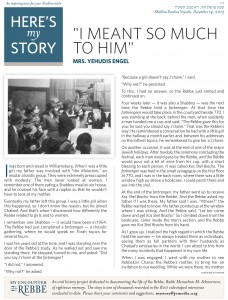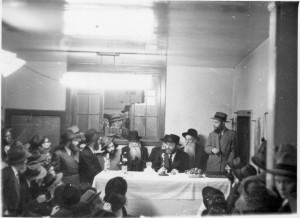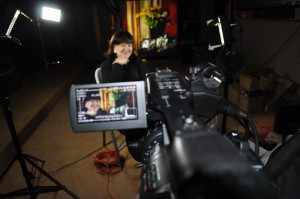HMS: “I meant so much to him”
I was born and raised in Williamsburg. When I was a little girl my father was involved with “the Malachim,” an insular chasidic group. They were extremely preoccupied with modesty: The men never looked at women. I remember one of them eating a Shabbos meal at our house, and he covered his face with a napkin so that he wouldn’t have to look at my mother.
Eventually my father left this group. I was a little girl when this happened, so I don’t know the reason, but he joined Chabad. And that’s when I discovered how differently the Rebbe related to girls and to women.
I remember one Shabbos – it would have been in 1954. The Rebbe had just completed a farbrengen – a chasidic gathering, where he would speak on Torah topics for several hours.
I was ten years old at the time, and I was standing near the door of the Rebbe’s study. As he walked out and saw me standing there. He stopped, turned to me, and asked: “Did you say L’chaim at the farbrengen?
“I did not,” I answered.
“Why not?” he asked.
“Because a girl doesn’t say L’chaim,” I said.
“Why not?” he persisted.To this, I had no answer, so the Rebbe just smiled and continued on. Four weeks later – it was also a Shabbos – was the next time the Rebbe held a farbrengen. At that time the farbrengens would take place in the courtyard beside 770. I was standing at the back, behind the men, when suddenly a man handed me a cup and said, “The Rebbe gave this for you; he said you should say L’chaim.” That was the Rebbe’s way: He remembered a conversation he had with a little girl in the hallway a month earlier and, between his addresses on the loftiest topics, he remembered to give her a L’chaim.
On another occasion, it was at the end of one of the major Jewish holidays. After havdala, the ceremony concluding the festival, each man would pass by the Rebbe, and the Rebbe would pour out a bit of wine from his cup, with a short blessing to each person. It was called Kos Shel Bracha. The farbrengen was held in the small synagogue on the first floor at 770, and I was in the back room, where there was a little window high up above a bookcase. I could perch there and see into the shul.
At the end of the farbrengen, my father went up to receive Kos Shel Bracha from the Rebbe. And the Rebbe asked my father if I was there. My father said I was. “Where?” the Rebbe wanted to know. My father pointed up at the window where I was sitting. And the Rebbe said “Let her come down and get Kos Shel Bracha.” So I climbed down from the bookcase, came inside the men’s section, and the Rebbe gave me Kos Shel Bracha from his hand.
As I grew up, I realized the high regard in which the Rebbe held the women – he always treated them as individuals, seeing them as full partners with their husbands as Chabad’s emissaries in the world. I can attest to this from the many incidents that happened in my own life.
When I was engaged, I went with my mother to see Rebbetzin Chana, the Rebbe’s mother, to bring her an invitation to our wedding. While we were there, my mother mentioned to Rebbetzin Chana that after we got married, we would be moving to Montreal. Rebbetzin Chana replied, “I know, my son told me.” So it was obvious that the Rebbe was discussing me – in other words, after all this time, he never forgot me, and I felt that I meant so much to him that he would even be discussing me with his mother, which to me was amazing. His caring was just amazing.
Right after our wedding, my husband and I decided to give one of the gifts we had received for our wedding to the Rebbe’s institutions, as charity. My husband sent it in to the Rebbe, but the Rebbe sent it back. He wrote to my new husband that he could not accept it unless it also had his wife’s signature, indicating that she, too, agreed to give it.
On another occasion my husband went to New York. The Rebbe gave him a blessing, but as he was walking away, the Rebbe called him back and said, “Why aren’t you asking for your wife?” So he asked for me and the Rebbe gave him a separate blessing for me.
Our first assignment as emissaries of the Rebbe was in Montreal, where my husband worked as the principal of a Talmud Torah school. I also taught in that school. From time-to-time, my husband would send a report to the Rebbe, letting him what was happening at the school; he would mention the different teachers and he would mention me and my class. At one point the Rebbe responded that he would prefer that I write myself rather than have my husband include me in his report. So I started writing on my own, and I received replies from the Rebbe.
Before I gave birth to my third child, the doctor wanted to induce delivery because I was overdue. So my husband called the Rebbe’s office to ask for a blessing, and he gave the details of what was going on. But then, the morning after I gave birth, my husband had a health issue, and needed to be hospitalized himself, so he never called New York to let the Rebbe know that I gave birth and that everything was okay.
A little later on that day, we got a call that the Rebbe wanted to know what was happening because he hadn’t heard from us. So, of course, we responded right away with the good news that our son Mendy was born. But then the Rebbe heard of my husband’s condition, and he realized that he was in no shape to help out with the baby, so the he issued instructions that somebody should be found to be there when I came home.
The concern the Rebbe had for his women emissaries, his regard for them was so high, that he remembered the smallest details.
When my oldest daughter got married, we were standing outside the Rebbe’s room with her groom, waiting for the Rebbe to come out. As was the custom, the Rebbe would give the groom his prayer book and the groom would use it to pray the afternoon service on his wedding day.
The Rebbe came out, handed over his prayer book, gave the groom a blessing and started to walk away. Then he turned around, pointed at me and said to the groom, “Since she is a daughter of a Kohen, you should learn an extra tractate of the Talmud before marrying her daughter.”
At this point in 1984, the Rebbe had tens of thousands of followers – not hundreds, not thousands, but tens of thousands – yet he remembered this small detail about one woman, that she was a Bas Kohen.
Mrs. Yehudis Engel and her late husband, Rabbi Eliyahu Engel served as Chabad emissaries in various locations in Canada, Australia and the United States. She was interviewed in the My Encounter studio in March, 2013.
This week’s Here’s My Story is dedicated
In honor of the Shluchim








No Comments to “HMS: “I meant so much to him””